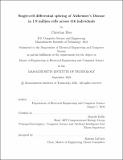Single-cell differential splicing of Alzheimer’s Disease in 1.9 million cells across 416 individuals
Author(s)
Hwa, Christian
DownloadThesis PDF (12.31Mb)
Advisor
Kellis, Manolis
Terms of use
Metadata
Show full item recordAbstract
Alzheimer’s Disease (AD) is a polygenic disease with variable phenotypic response among patients. While single-cell differential expression data can provide important information regarding the disease’s pathology, it only captures steady-state cell behavior. By contrast, RNA velocity analysis allows inference of both direction and magnitude of regulatory changes occuring over disease progression. However, despite the success of existing RNA velocity analyses, the pace of disease progression remains uncharacterized, as previous work focused primarily on macro-scale trajectory diagrams and failed to capture trajectories of individual genes relative to global pathological changes.
Here, we use scRNA-seq profiling of 1.9 million cells from dorsolateral prefrontal cortex of 416 post-mortem human samples to model temporal regulatory changes of AD. We use RNA velocity to infer spliced and unspliced counts for each gene and a beta-binomial distribution to model the unspliced/spliced ratio, and we identify differentially-spliced genes across six brain cell types and differentially-spliced genes between AD and control cohorts. Of 16,948 expressed genes, 1158 genes show significant differential splicing (DS) effects with FDR<0.05%. We find that cell-type specific and globally-altered genes are significantly enriched in AD-associated processes, including dysregulation of the TNF pathway in astrocytes, dysregulation of PD-L1 expression across all cell-types, cellular transport, and lipid dyshomeostasis.
Overall, our study provides a novel method to analyze and compare the RNA velocity between AD and non-AD cohorts, and identifies a new set of differentiallyspliced AD genes, when previous analyses focused primarily on gene expression changes.
Date issued
2022-09Department
Massachusetts Institute of Technology. Department of Electrical Engineering and Computer SciencePublisher
Massachusetts Institute of Technology